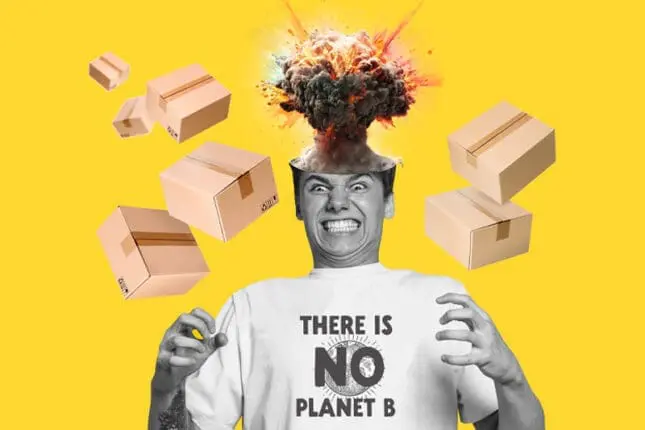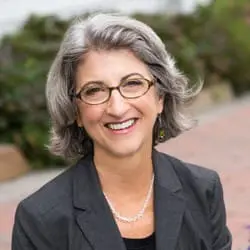I could tell from the moment I saw him in the waiting room that Jack
was seething with anger. Instead of the usual exchange of pleasantries when I greeted him, he simply nodded and stalked into my office.
Seated on the couch, he waited for me to close the door.
“I know that Amazon box in your waiting room isn’t yours,” he declared before I had a chance to ask him what was going on.
“From your tone of voice, I’m guessing you don’t know if that’s true,” I replied gently. “Are you asking if it’s mine?”
“Of course I’m asking,” Jack said. “Based on our conversations about the natural world, I’d assumed you feel the way I do about companies that don’t give a shit about their environmental impact.” Early in our work, Jack had mentioned his love of hiking and how disturbed he was that his favorite national parks were either flooding or on fire. He and I had briefly agreed that the weather events that summer were scary, and that people should do what they could to prevent them from worsening. I remembered adding that I thought the issue was more complex than the media made it out to be, but that had been months ago.
“I’m horrified that someone in your office suite is buying from Amazon,” he continued. “And if it’s you, well, I’m immensely disappointed. Don’t you get how screwed we are? Our forests are burning. Our oceans are rising. Our clean water sources are in jeopardy. There’s a real possibility we’re all going to die of thirst, and buying from companies like that is just going to make that happen sooner. It makes me furious to see people, educated people like you, doing such harmful things.”
Because I know from nearly 40 years in the field that the careful and sensitive exploration of a client’s feelings requires an equally careful and sensitive exploration of our own emotions, I took some time to look inward. I recognized resentment. How dare he challenge me on my values like that?! I’m conscious of my carbon footprint! I noticed my own anxiety about the climate start to rise. Are we really all going to die of thirst? This morning’s newsfeed flashed in my head: a risk of bird flu moving to humans, the Canadian wildfires kicking up again, the hottest summer on record predicted, and the U.S. and Mexico fighting over water resources.
Like so many of my friends, family, colleagues, and clients, I worry about the environment. Although the DSM doesn’t have an official diagnosis for climate anxiety disorder, I’ve seen and read about symptoms that include sleep and appetite problems, ruminating thoughts, and sometimes panic attacks. My worries are mild in comparison, but I still have a gnawing concern.
If I were to bring my worries into therapy, an attuned clinician would probably use some cognitive behavioral tools sprinkled with a few calming techniques, like mindful breathing or a guided somatic awareness exercise. They might be curious about some of the personal meanings attached to my concerns, and I hope they’d introduce the viewpoint of many climate anxiety experts: that taking some sort of action, no matter how small, has value. Not only can action increase a sense of agency and thereby lessen anxiety, but multiplied by many people, small deeds can lead to big changes.
One action people can take is participating in campaigns that ask online companies to curtail their use of excessive packaging—something I’d done years ago but didn’t mention to Jack. In an example of small actions leading to significant change, Amazon responded to this kind of community activism with a program to reduce its carbon footprint, and has engaged other companies in these efforts, too.
Still, I succumb to the convenience of online shopping more than I should, and I feel bad about contributing to an economic system that takes money away from small, local businesses. I consider this inner struggle as I listen to Jack, reaching beyond the contours of my guilt into my sense of vulnerability, tinged with echoes of past worry about my own safety or the safety of those I love.
Jack had legitimate reasons to be upset about the box in my waiting room, but could his righteous anger reflect something more than his worry about the environment? He’d come to therapy for help navigating romantic relationships. He had several good friends, but his last girlfriend had declared him a hothead and had left. He’d acknowledged that he was often angry, but felt it was justified. “I don’t suffer fools gladly,” he’d told me.
Was there any link between his anger about my environmental fail and his difficulty in intimate relationships? In her book The Dance of Anger, therapist Harriet Lerner suggests that outrage is often a response to feelings of vulnerability, because anger feels strong, while vulnerability feels weak and unsafe. I’d long suspected this was true for Jack, but I had difficulty getting him to a place where he could see it. Maybe the Amazon box was a way in.
“I get the impression you’re assuming the box is mine,” I said, “which makes you angry with me. And I’m guessing this feels like a betrayal.”
“But even if the box belongs to someone else in your suite,” he said, “I’m mad at you for not standing up to them about their support of that disgusting company.”
I nodded. “So even if it’s not mine, I should take some responsibility for the behavior of any colleague who supports Amazon and try to raise their awareness about the severity of the problem.”
“No one in this country can possibly be ignorant of the severity of the problem,” he replied. “I fault you and them and everyone else who behaves selfishly as we plummet to our collective doom.”
“And we’re all vulnerable, and not able to make a grand change, no matter how hard we try,” I said.
He gave me a hard look, but his voice softened. “I really hate that word,” he said. “Vulnerable.”
This was the beginning of a conversation about vulnerability that continued for several months and eventually led to Jack’s understanding that his anger was often tied to feeling helpless and frightened—childhood feelings he hated to acknowledge. He didn’t change overnight, nor did his growing understanding of himself enable him to change the world, but it did help him maintain a meaningful relationship—with a woman who works as an environmental lawyer, in fact.
As for me, I took his criticism seriously. I’ve been reading Elizabeth Bechard’s book Parenting in a Changing Climate, which is touching, powerful, distressing, hopeful, and useful, whether you have children or not. I’ve been reviewing The Handbook of Climate Psychology, which offers useful advice for clinicians who don’t want to push their own thinking on clients but also don’t want to deny or downplay their concerns. And I’ve worked harder to stop buying things online and increased my contributions to environmental organizations I support, thereby increasing the power of my voice.
It’s not enough, and I still worry, but when it comes to climate concerns, I don’t think worrying is necessarily a bad thing.
ILLUSTRATIONS © MASTER1305 , JASINSKI , IRINA GUTYRYAK
F. Diane Barth
F. Diane Barth, LCSW, is a psychotherapist, teacher, and author. She’s written about women’s friendships, aging, and integrative psychotherapy. She blogs for Psychology Today and on Substack.













